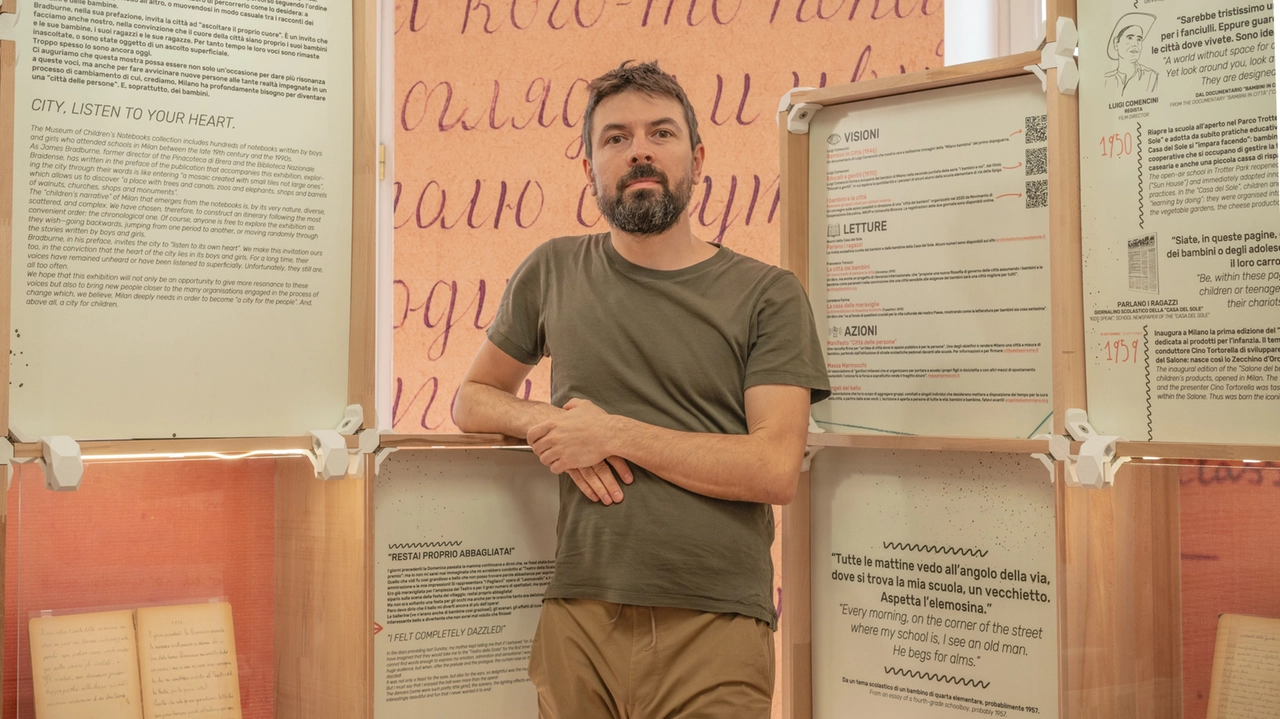The School Notebook Museum in Milan: "They Help Us Discover Ourselves"

July 17, 2025

Thomas Pololi in the museum on Via Broletto where 1,500 Italian notebooks and another 1,000 from 35 countries are preserved
Milan – “The new year has just begun. We don't know if it will be happier or sadder than the last, but we, with our actions, will decide that.” These are the reflections of a Genoese child who, in the 1970s, wrote one of his first essays at school. The handwriting reveals the indecision of someone who has only recently learned the art of writing, but its content possesses the maturity of someone who has lived a thousand lives. And those words from over fifty years ago, so remarkably relevant today, are preserved in the “ Museo dei Quaderni di Scuola ,” a small space in the heart of Milan (on Via Broletto) that houses diaries, essays, and letters written by boys and girls between the late 1700s and the early 2000s . A place where history is filtered through the innocent gaze of the littlest ones. “Around 2000, I started collecting some material. I didn't have too many expectations, I simply wanted to open a blog,” says Thomas Pololi, the museum's creator and curator. “But in 2022, the opportunity arose to have a space in which to preserve what for me are truly museum pieces.”
Pololi takes a reverse path : abandoning the online world to embrace the offline dimension, creating a microcosm in which to rediscover the beauty of ink imprinted on paper. These pages recount the past with an eye to the future : "These notebooks are a key to understanding the world: like a magnifying glass, they show us what happened within the four walls of our homes, but at the same time they offer us a glimpse of the moments that have shaped history," explains the curator. And wandering through the museum, it's possible to turn back the hands of time, discovering through the eyes of children the Germany of Nazism or the Italy of the Hot Autumn and the workers' struggles. In fact, in the Pololi space, there are over 1,500 Italian notebooks and another 1,000 from 35 other countries. From Italy to China, all the way to Japan: this small space preserves the history of the entire world. Ink becomes a tool capable of breaking down differences and building bridges between distant cultures and lands: "I think there's nothing more universal than childhood; in the end, we were all children," says the creator. "And leafing through these pages, we realize how similar we all are, no matter how many miles separate us."
Every day, Pololi scours the internet and compares various online sites in search of letters and diaries from every corner of the globe : "The Italian material arrives thanks to donations," explains the curator. "While this material comes from abroad, online research is the key to reaching an ever-increasing number of people. Many, after clearing out their cellars or moving house, recover old notebooks and choose not to throw them away, but to give them a second life." For Thomas Pololi, however, it's also important to reflect on the evolution of the city that welcomed his small museum: precisely for this reason, he recently organized a temporary exhibition to chronicle the evolution of Milan in the 1950s. And so, collecting this material has allowed him to reflect on how, over time, the relationship between children and the Lombardy capital has changed. "The rampant urbanization of that period paradoxically raised barriers between residents," Pololi explains. "And the first to be surprised are the children who, once they arrive here, realize how, compared to the past, there is much more closure and distrust towards those around us." The Notebook Museum is a time machine, a journey to understand how the choices of the past have influenced the present we inhabit: "Reading these children's notebooks, we can't help but discover something about each of us," Pololi adds.
© Reproduction reserved
Article Tags
School Museums Children From the citiesIl Giorno




